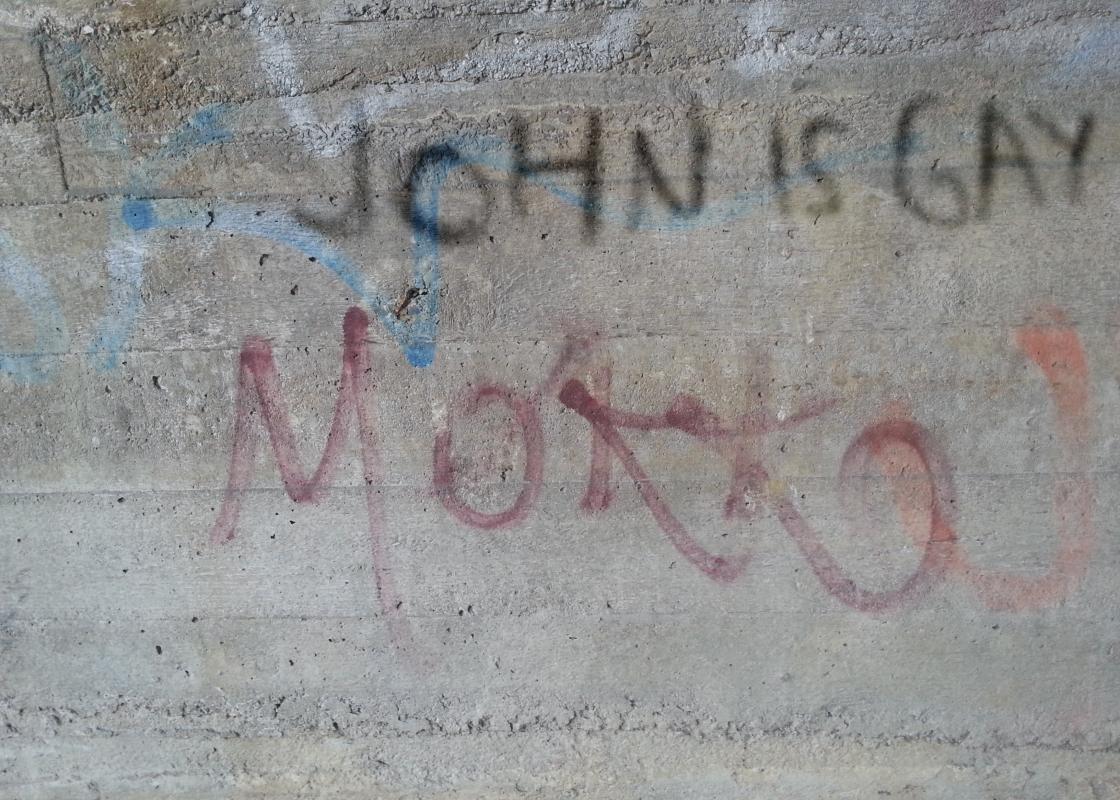Hilde Slåtten recently submitted her PhD thesis, presenting the use of gay insults in the Norwegian lower secondary school and its damaging effects. Slåtten is a research fellow at the Department of Psychosocial Science at the University of Bergen.
“You’ve written a dissertation about how frequent Norwegian youth use gay nicknames as insults, to whom these words are directed, and to what extent the use of such words may cause depressive symptoms on the affected part. Why did you decide to study this?”
“I think the topic is important, and the whole thing started with my master’s thesis. Being a lesbian myself, I wanted to identify schools creating a good climate for gays and lesbians. We hear that the word ‘gay’ is used as an insult among young people. It’s important to work against this, as it creates an understanding of homosexuality as something negative.”

“Are gay-related insults common?”
“In my study, 54 per cent of the boys had called a friend gay during the past week. The same applied to 30 per cent of the girls. 40 per cent of the boys had directed the insult toward someone he didn’t like, compared to 30 per cent of the girls.”
“Why do you think boys use these insults more than girls?”
“The most common explanation is related to masculine gender norms: Boys tend to have slightly rigorous perceptions concerning how they are supposed to behave. Gay insults are used when someone breaks with the norms. Boys who score high on so-called emotional restriction – that is those who think that boys shouldn’t let their feelings show – are more prone to use gay insults than others.”
“You asked questions related to emotions and mood in order to identify levels of depressive symptoms. Did you find the boys to have the highest levels?”
“Yes. Both boys and girls who are exposed to gay insults from people they don’t know or who don’t like them have higher levels of depressive symptoms than others. But the gay insults are particularly harmful when they’re used against boys in a bullying situation.”
“Do girls find the insults less offensive?”
“Yes, it seems that way. To be accused of being gay is worse for a boy than for a girl. It probably has to do with the fact that girls have larger wiggle room when it comes to acceptable behaviour.”
See also: Boys more exposed to relational bullying
Most common among friends
“Context is important in your research. Gay insults are most harmful when they’re used in bullying. But this is not the most common context for these insults?”
“No. The use of these insults is most common in friendly situations and far less common when it comes to bullying or among strangers.”
“Among those who are exposed to gay insults in friendly settings, do you find increased levels of depressive symptoms?”
“No.”
“Are you worried that your research findings may be used to render this kind of name-calling harmless?”
“I think a lot of people have this impression anyways – that this use of insults among friends is harmless. But that is not the case.”
“In what ways might it be harmful?”
“It may be difficult to distinguish between a friendly and an unfriendly situation. Moreover, this type of name-calling has stigmatising effects on lesbians and gays.”
“… even when the words are not directed towards them?”
“Yes. The words are used in a negative sense. Besides, there are normally more homosexuals in a circle of friends than these young people are aware of.”
Changes might have occurred already
“You use the term ‘gay insult’. Is this an unproblematic term?”
“In my dissertation I talk about ‘gay-related name-calling’. It’s a bit laborious. ‘Gay insult’ is a negatively loaded term, but that is also the way these words are used. Even when two friends use gay-related name-calling, the use of these words contribute to the marginalisation of gays and lesbians.”
“A lot of research has been carried out internationally on homosexuality and bullying. It has been important for you not to over-use the term bullying. Why is that?”
“Because gay-related names are used in friendly settings as well. In order to qualify as bullying, it has to be done with an intention to cause harm. It must go on over a period of time, and it has to take place among two unequal parts in terms of power balance. Gay insults may be part of bullying, but they also occur in other settings. It’s important to add nuance to the research.”
“You collected your data in 2010. Is there reason to believe that changes might have occurred since then?”
“Yes, that might well be. In an attitude survey carried out in collaboration with Professor Norman Anderssen in 2008 and 2013, we found that fewer people had negative attitudes toward gays and lesbians in 2013. But this does not necessarily affect the namecalling. And I would claim that we have reasons to believe that the connection between namecalling and depressive symptoms is the same as before.”
See also: Young women twice as exposed to cyber bullying as men
Recommends campaigns
“You have clear recommendations for how to proceed in this field. Among your recommendations is research carried out with a representative, nationwide selection. Would you expect other results from such a project?”
“My study is based on invitations to schools, and schools are in general difficult to recruit. Those who chose to participate may already have had special focus on the topic, or they might have had particular challenges related to this area. But the connection between depressive symptoms and gay-related name-calling will nevertheless be the same.”
“You recommend that gay insults are included in the general anti-bullying campaigns in the schools. Do you think many of the teachers fail to take the name-calling seriously enough?”
It may seem as if some teachers think of it as so common, and especially among friends, that it’s not harmful. But the teacher can never fully know the relation between two pupils. And when the insults are used against people you don’t like it increases the risk of depressive symptoms.”
“So words like these are rarely used in a positive way?”
“That's right. Young people use these kinds of words because they hurt. They wouldn’t use them if they were considered neutral.”
Still negative attitudes
“Fifty people were recently killed in a gay nightclub in Orlando in the U.S. According to the killer’s father, the motive was homophobia. In light of your own research, what are your thoughts regarding this incident?”
“It was a terrible incident, and it shows that although we have come a long way, there is still a way to go. We don’t quite know whether the background for this incident was hate crime or something else, but it nevertheless reminds us of how important it is to focus on this topic. There are still a lot of negative attitudes towards gays and lesbians.”
Reference:
Gay-related name-calling among young adolescents – Exploring the importance of the context, Hilde Slåtten, University of Bergen, 2016.
Translated by Cathinka Dahl Hambro
The research is based on questionnaire data from 921 ninth grade pupils (14-15 year-olds) from 15 schools.
One of the questions asked was how often the participants had used names such as ‘gay’, ‘lesbo’, or ‘fag’ during the past week, either on friends, people they didn’t like, people they didn’t know, or people they thought were homosexuals. They were also asked to state their reasons for this name-calling. Moreover, the participants were asked about their moods and emotions the past week in order to identify their level of depressive symptoms.
The data were collected as part of an intervention study, with the objective of reducing the use of gay-related name-calling, gender-related bullying, and sexual harassment. The data were collected prior to the intervention.


